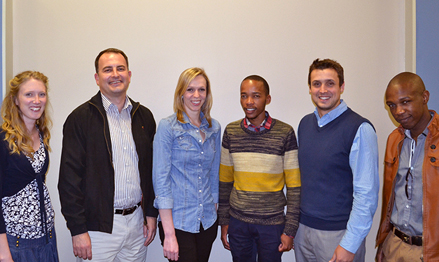Latest News Archive
Please select Category, Year, and then Month to display items
13 August 2024
|
Story Anthony Mthembu
|
Photo Sibahle Dayimani and Amandla Kulu
 Prof Peter Roseel, Managing Director of Management Consulting and Research – a spin-off of the Catholic University of Leuven in Belgium; and Prof Nicolene Barkhuizen, Director of the UFS Business School.
Prof Peter Roseel, Managing Director of Management Consulting and Research – a spin-off of the Catholic University of Leuven in Belgium; and Prof Nicolene Barkhuizen, Director of the UFS Business School.
The Business School at the University of the Free State (UFS) hosted Prof Peter Rosseel, Managing Director of Management Consulting and Research – a spin-off of the Catholic University of Leuven in Belgium – for a guest lecture during his visit to the UFS Faculty of Economic and Management Sciences (EMS).
The guest lecture took place on 19 July 2024 in the Business School Auditorium and was attended by academics from the UFS.
Reflecting on the lecture
The lecture presented by Prof Rosseel focused on how combining strategy, strategy implementation, culture transformation, leadership, and learning successfully leads to sustainable growth, creates engagement, and delivers tangible results. Throughout the lecture, Prof Rosseel spoke about how experts tend to make bad leaders and therefore stop change from happening within an organisation. In fact, he highlighted that, “Experts stop change from happening within the workplace because experts, by definition, look through the eyes of their expertise, but you cannot reduce the world to different forms of expertise, as it is holistic.” As such, he argued that to change an organisation, one must see things from the point of view of others.
Furthermore, Prof Rosseel delved deeper into the hierarchical operating model within organisations. He indicated that the above model should be one community within organisations; however, unfortunately it is not. This is because organisations are made up of several departments such as finance and human resources. As such, he regards these departments to be silos that could prove to be detrimental to organisations, as each silo can create its own culture as opposed to an organisational culture. These are some of the points he discussed throughout the lecture.
After the lecture concluded, the audience had the opportunity to engage with Prof Rosseel on his viewpoints. In fact, Lyle Markham, Academic Head of Department and Lecturer in Industrial Psychology at the UFS, was one of the audience members and described the lecture as insightful.
UFS gets support for improving university access and success in South Africa
2013-10-24
|
 |
|
Members of the SASSE Research team are from left: Carike Jordaan, Dr Francois Strydom, Lana Swart, Seisho Gaboutlwelweboutlwelwakemo, Michael Henn en Katleho Nyaile.
Photo: Supplied
24 October 2013 |
The university’s Centre of Teaching and Learning (CTL) received a grant for US$820 000 (about R8 million) from the Kresge Foundation for their South African Survey of Student Engagement (SASSE) research team.
The SASSE research team is committed to furthering student access with success by promoting quality teaching and learning institutionally and promoting collective impact around student success nationally.
Through this three-year project, the SASSE team aims to provide a range of deeply contextualised and globally benchmarked student engagement measures that can be used at institutional and module/course level for the South African context. The data from these measures can be used to improve the quality of undergraduate teaching and learning, and participating institutions will have access to appropriate capacity development interventions to empower them to use the data to promote evidence-based change in their institutions.
Dr Francois Strydom, Academic Director at the CTL, says the lessons from this higher-education project could be used to develop a stronger post-school sector which could help the country to deal with the massive challenge of youth unemployment; thereby promoting equity, social justice and a prosperous democracy in South Africa.
The Kresge Foundation is a private philanthropic foundation in the United States, which is focused on creating opportunity for low-income people through various programmes. This three-year project forms part of the Kresge Foundation’s Education Programme, which focuses on promoting access and success at South African universities. Therefore the SASSE project aims to contribute to the Kresge-sponsored Access and Success in Higher Education in South Africa (ASHESA), to promote a national conversation on improving student success.
In January this year, the university was one of four South African universities selected to take part in a multi-million rand programme to bolster private fund-raising and advancement efforts. For this programme the UFS was granted US$640 000 (about R5,6 million) over a period of five years.